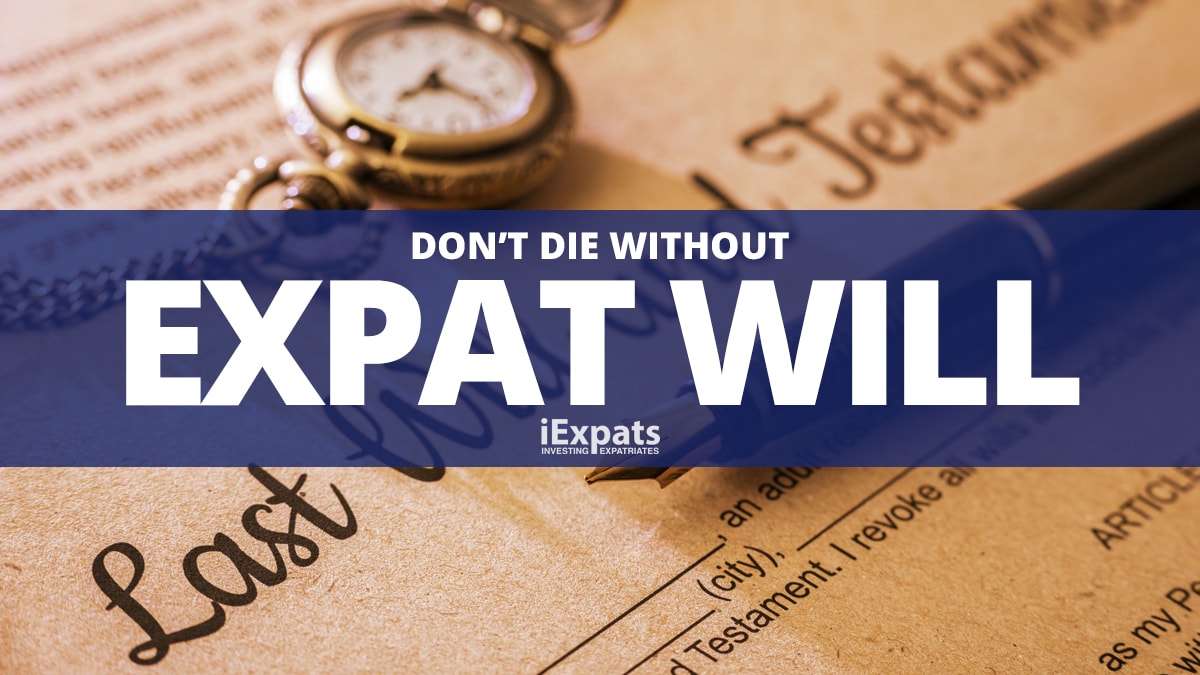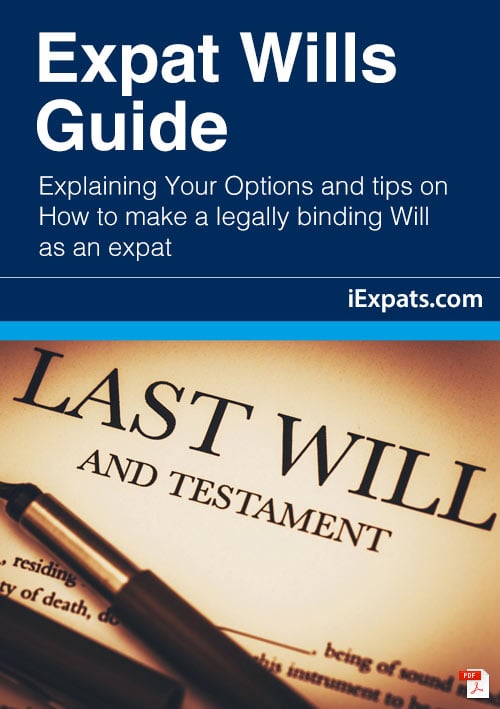If an expat dies without a will, any estate is split according to the rules of intestacy – which means the person someone wants to inherit their wealth may not always receive what they are due.
Intestacy is the legal term for what happens to money and property when someone dies without a valid will.
An estate is the net worth of someone who has died after clearing any debts, bills and funeral costs.
Intestacy rules do not recognise unmarried partners, so nothing would pass to them
If you die without a will as an expat, domicile not residency determines how movable property, like cash, jewellery, antiques and personal possessions are distributed.
It’s likely any immovable property, such as land and homes would fall under the intestacy rules of the country where the deceased expat is resident.
That’s why it’s a good idea for expats to have a will in each country where they have any valuable assets.
What Is A Will?
A will is a formal, legal document that lays out someone’s final wishes about how they wish their estate distributed after their death.
The laws of each country detail the format and contents of a will.
Although expats can write their own wills, if they make an error the will can be challenged in court.
Find out more about expat wills
What Is Domicile?
An expat’s domicile is chiefly decided by the place where their father was domiciled when they were born, but other factors can apply.
Generally, the intestacy laws of where someone is domiciled apply when they die to their property bar any land or buildings.
Find out more about residency and domicile
Jointly Owned Property
Special intestacy rules apply if the deceased expat jointly owns property with a spouse or civil partner.
Joint tenants – who will each usually hold a 50% share – automatically gain the deceased partner’s share.
Tenants in common – who can hold shares ranging from 99% to one partner and 1% to the other and 51%:49% – do not automatically inherit the other’s share.
Intestacy Rules (England & Wales) Step-By-Step
This step-by-step guide covers intestacy rules for expats domiciled in England and Wales.
If you are resident or domiciled elsewhere, then discuss making a will with a local lawyer.
Expats with a surviving spouse
If the deceased has no surviving children, the spouse gets everything – don’t forget spouse means civil partner of a same-sex marriage as well.
If the deceased has surviving children, the spouse inherits all the deceased’s personal belongings and the first £270,000 of the value of the estate. The remaining estate – called the residue by lawyers – is equally split between the spouse and any children.
Expats with no surviving spouse
If an expat passes on without a surviving spouse, splitting their estate becomes a lot more complicated.
Who gets what is decided by several ‘yes/no’ questions in order of importance:
Does the deceased have surviving children?
Yes – then each child inherits an equal share of the estate.
If there are no surviving children:
Does the deceased have parents?
Yes – then each parent gets an equal share
If no:
Does the deceased have any full-blood brothers or sisters?
Yes – each sibling gets an equal share
If no:
Does the deceased have any stepbrothers or sisters?
Yes – each gets an equal share
If no:
Does the deceased have any grandparents?
Yes – each gets an equal share
If no:
Does the deceased have any full-blood aunts or uncles?
Yes – each gets an equal share
If no:
Does the deceased have any half-blood aunts or uncles?
Yes – each gets an equal share
If no:
The estate goes to the Crown
Children And Intestacy Rules
If relatives in any of the above steps have died before the deceased expat, their children inherit, but step relations have no intestacy entitlement.
Divorced partners do not inherit, but the former couple’s children do.
However, a child from an unmarried relationship still inherits under intestacy rules – and they can inherit from grandparents or great-grandparents.
Children cannot inherit unless they are aged 18 or over unless they marry younger. Trustees manage their share of the estate on their behalf.
Adopted children may inherit under intestacy rules.
Grandchildren or great-grandchildren cannot inherit unless their parent or grandparent pre-deceases the intestate expat.
Nephews And Nieces
Nephews and nieces can inherit from someone who dies intestate if their parent is related by full or half blood to the deceased and their parents are also dead.
People Barred From Inheriting Under Intestacy Rules
Some close people who cannot inherit if an expat dies intestate:
- Unmarried or ‘common law’ partners
- In-laws
- Friends
- Carers
Deeds Of Variation
A deed of variation or a deed of family arrangement (they are the same) can alter the way an estate is distributed if an expat dies intestate, providing everyone due to inherit agrees to the changes.
The deed is only valid if made no more than two years after the deceased died.
Under the deed, someone ruled out from inheriting can be left a share of your wealth or the percentage shares can be rearranged.
Who Inherits If An Expat Dies Without A Will FAQ
Intestacy rules are complicated and who inherits may change with major life events, like marriage, divorce, birth of a child or a death in the family.
Expats who want to ensure their estates are distributed to the people they want to inherit talk with a lawyer in the country where they live.
You should have the will checked over by a legal professional. An invalid will – one that is not accepted by the courts – is likely to mean your estate will revert to distribution under the rules of intestacy.
No. Intestacy rules in England and Wales are based on common law – which is a mix of tradition and case law handed down by the courts. Many other countries have statute law to determine intestacy, while some countries, such as the Gulf States also rely on religious practice.
If you have bank accounts or possessions outside the UK, you should make a will in each place to avoid the problem of intestacy.
No. Divorced partners are excluded from inheriting under the rules of intestacy.
Yes. Your spouse inherits all your movable assets if your estate is valued at less than £270,000.
No. The division is based on a matter of fact – their relationship to you – rather than a matter of choice, which would arise if a will is made.
No. You need to make a will specifying that someone is disinherited and leave a letter with the will explaining your reasons in case the will is challenged in court.
No. To leave money to a charity you must make a will.
No. As an expat, your home will probably be dealt with under the intestacy rules of the country where you live. Speak to a local lawyer to resolve the issue.
Bona vacantia comes into play if someone dies without any surviving relatives. Instead of passing to your family, the estate passes to the British Crown. If someone claims the estate, the Crown can make grants, but has no obligation to do so.
Related Information
Below is a list of related articles you may find of interest.

